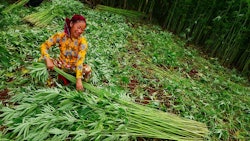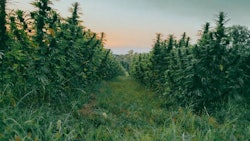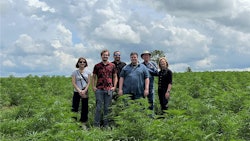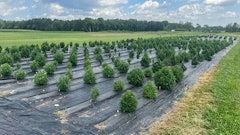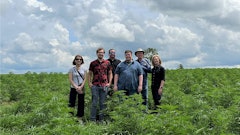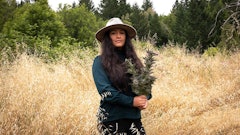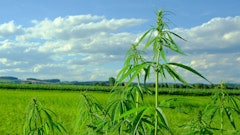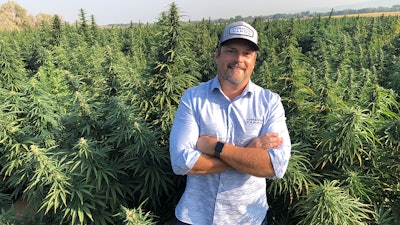
The autumn season brings pick-your-own pumpkins and apples at local farms, and one Colorado-based hemp business has joined the fun with an annual pick-your-own hemp event.
Typhoon Farma, a 70-acre hemp farm in Montrose, Colo., wrapped up its third annual pick-your-own hemp event earlier this month. Opening the operation to the public helps demystify the plant, according to Chief Operating Officer Ryan Eakes.
“When they get up here and they see it and they see us treating it just like any other crop, it makes it seem more approachable, I think,” Eakes tells Cannabis Business Times.
Typhoon Farma launched in 2019, after the 2018 Farm Bill federally legalized the cultivation and sale of hemp containing no more than 0.3% THC. The company differentiated itself as an operation specifically dedicated to hemp, Eakes says, setting itself apart from farmers who transitioned to hemp cultivation after years of growing other commercial crops.
Although his professional background lies in construction, Eakes grew up on a tomato farm.
“Farming wasn't completely out of the realm of knowledge for me, but … it’s not like we were growing something else and decided, ‘Hey, let’s give hemp a try and see if it works,’” he says. “We set our farm up specifically to be biomass producers, and then we targeted trying to be the best biomass producers we could be.”
The farm has focused on cultivating the best genetics it can find and aligning itself with the best processors in the market, although, Eakes says, the ultimate goal is to launch Typhoon Farma’s own brand of products.
Typhoon Farma started out growing 125 acres of hemp but scaled back to 70 acres this year due to uncertainty in the market.
RELATED: Montana, South Dakota, Oregon Report Most Acres of Hemp Planted in 2022
For the annual pick-your-own hemp event, Eakes targets three days out of the year, typically in September, just before harvest. He aims for a time when the plant is developed enough for visitors to appreciate it, but not so developed that it becomes a hot crop that contains more than the legal level of THC.
Eakes launches advertising efforts three or four months in advance, relying on Eventbrite, an event management and ticketing website, and word of mouth.
“When I put it on Facebook and Instagram, … it violates Meta’s policies [and] they won’t let me promote it. They’ll pull it down immediately once I start any promotions,” he says. “When I post it on Eventbrite, for some reason it sticks and then it translates into the Google calendar. So, when you search on Google [for] events happening in Montrose this weekend, our event usually pops up.”
Eakes describes the event as an open house where visitors can ask questions and learn about hemp farming and the plant itself.
“We usually teach them quite a bit about the plant when they’re here,” he says. “It’s not like we have set times where there's a speaker at 11:00 and then this is happening at 1:00. They just come out and we spend as much time as we need to with the customers.”
For the most part, Eakes says visitors are surprised when they see the farm.
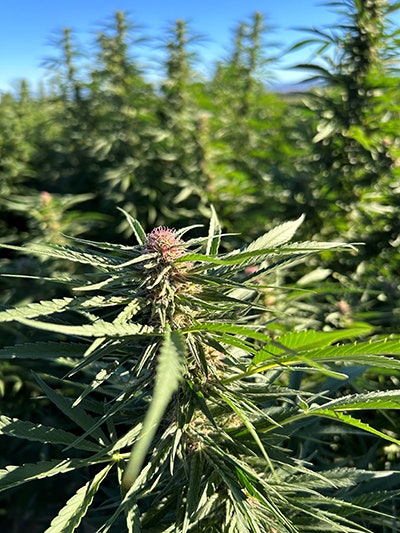
“Typically, this is not what people expect when they come out here and … everybody is kind of blown away when they see it,” he says. “They’re expecting the tall fiber hemp, the nine-foot-tall, bamboo-looking hemp. But the stuff that we’re doing is for flower production and it looks just like marijuana. It looks indistinguishable. So, when they come out here, … they had a preconceived notion about what they were going to see, and then they look at all these plants that look like traditional marijuana plants, but they're low THC, and that usually sets off a flurry of questions.”
Typhoon Farma staff members stay close to visitors to address their questions and help cut the hemp for those who want to take some home.
“We’ll walk with them through the rows and get to a point where if they want to go cut their own, we’ll just take [a] pair of loppers and then off they go in the field and … they’ll have us pick the one that we think is the best, and then we’ll cut it for them and just handle it and put it in their car for them,” Eakes says.
Customers aren’t required to purchase hemp to take home, but those who do are asked to take an entire harvested plant.
“As far as quantity, there’s really no limit because essentially the plant is cut and it’s harvested, so it’s not like the growing restrictions in Colorado, [which is] six … plants per adult per household,” Eakes says. “This is different. We’re not giving them a live plant; we’re actually harvesting the plant for them and cutting it off at the base. So, if somebody came out and they’re like, ‘I need 20 plants,’ that’s fine. We can cut them 20 plants. I couldn't give them 20 live plants. We’re not licensed to do that, but I can give them 20 harvested plants.”
As far as other rules, visitors must sign a waiver before entering the hemp field.
“It is a working farm, so they just need to be aware of heavy equipment and ongoing work,” Eakes says.
“And then they need to agree that this plant is for their personal use because they’re not allowed to resell it, because obviously they’re not licensed to resell any plants. Some people may have the idea of taking a plant home and trimming the buds and then selling the buds, but unless they’re licensed to do that, they can’t. So, we need to make them aware of that.”
Over the last three years, Typhoon Farma has seen an average of 150 to 200 visitors during each pick-your-own hemp event.
Eakes says that getting the word out about the event and getting people interested in visiting the farm is half the battle, especially due to the persisting stigma around cannabis.
“The area we’re in, it still kind of has a scarlet letter and it’s not wholly accepted,” Eakes says. “I think when people think about it, they see the signs on the street, they see the flyers that we put up in the coffee shop, and they’re like, ‘Hmm, that sounds interesting, but I don’t know if I want to go to it,’ because they’re just nervous, I guess. They don’t know what to expect. So, I think getting the word out there to as many people as possible is the key, [as well as] finding the way to advertise it so it hits the right people.”
The event is starting to gain traction, he says, as visitors from past years tell their friends and family about the experience.
“We want people to understand what this plant is and what it can do,” Eakes says. “I have people come up to me and they’re like, ‘I’ve suffered from fibromyalgia for years, and this is the only thing that helps me.’ So, getting to connect with those people somehow, some way, that’s the key to the success of it. And then each year we keep getting repeat customers and then they’re bringing their friends, and that’s how it’s going to continue to build, I think.”
Eakes plans to continue hosting the annual pick-your-own event and wants to bring in other local companies to put on demonstrations for visitors.
“I hope to have maybe a hempcrete vendor come in here and show people how to make hempcrete or what can be done with that as one application of our fiber,” he says. “We’ll keep refining it and making it more educational. Education is a key focus for us and the Montrose community. … We want to make sure that everybody in the Montrose community knows who we are and what we’re doing and why we're doing it. We want to be good neighbors.”











